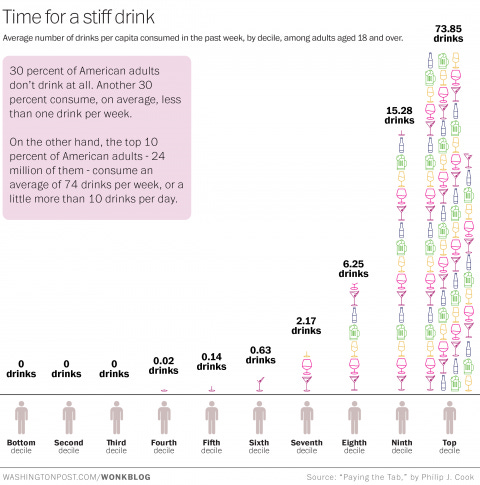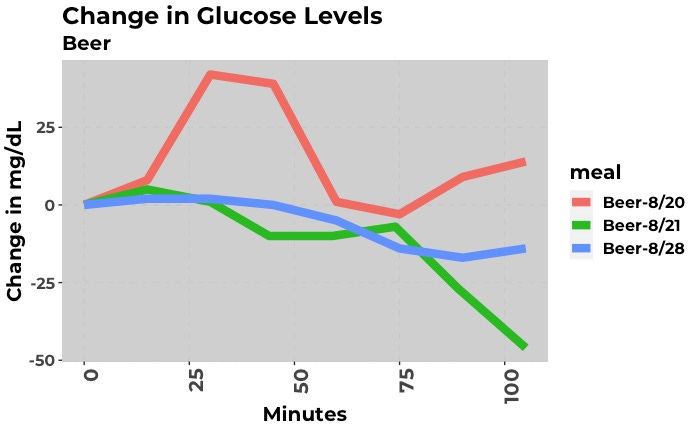Is red wine good for you? Most mainstream health advice concludes that moderate alcohol consumption is fine, and maybe even net positive for some people.
This week we’ll look at some of the ways a personal scientist can decide.
The downsides of alcohol at a population level are undeniable. Nearly all sexual abuse and most crime is accompanied by drinking. A massive 2016 global study commissioned by the Gates Foundation concludes that “the safest level of drinking is none”. That may be why many notable leaders, from Presidents Biden and Trump to Warren Buffett never touch the stuff.
Although I’ll still occasionally have a drink in special social situations, I concluded through my own testing that alcohol just “isn’t worth the squeeze”. Of course, a key premise of personal science is that we’re all different and your experience could be different. But how can you know?
Alcohol isn’t that popular
In my experience, most drinkers assume that “everybody does it” and are surprised to learn how many people never touch the stuff. Nearly all alcohol is consumed by a tiny percent of the population.
What about other countries? Again, many social drinkers are surprised to learn that more than a quarter of Italians don't drink at all — a similar percentage as Russia. Today’s French drink only 1/4 as much as they did in 1960. You’re not weird if you abstain.
How alcohol affects your body
Moderate alcohol consumption measurably impacts the body in several ways. It can enhance the diversity of the gut microbiome (but is that necessarily good?), particularly with polyphenol-rich drinks like red wine. Heart rate may increase temporarily post-consumption due to alcohol-induced blood vessel dilation. While alcohol might aid in initial sleep onset, it disrupts sleep quality, particularly reducing REM sleep.
For some people, alcohol can actually lower the blood glucose response. Here’s what happened to me while wearing a CGM, each time drinking one bottle of (regular, i.e. high-carb) beer. The spike happened when I drank on an empty stomach; the others were with a meal that included fat.
You may find the same lowered glucose response, but before you assume this means alcohol is good for you, consider the underlying reason. Alcohol prevents the liver from releasing glycogen, which is the molecule the body can turn into glucose. In other words, alcohol suppresses the additional glucose you'd get naturally when your blood sugar levels go down, usually when fasting. But this is a temporary affect: that glycogen is still there and will be released eventually. If your CGM conforts you into consuming more carbs than otherwise, you may end up worse off.
Many studies have looked at how alcohol changes the gut microbiome. Zinc-carnosine, curcumin, berberine and have some fiber foods or color-rich foods can supposedly help offset the alcohol related damage.
I’ve also tried the Zbiotic’s probiotic “shot” , which contains a strain of Bacillus subtilus that likes to break down alcohol in the gut. It didn’t cause any noticeable affects on me one way or another, though I didn’t test it rigorously enough to have a final conclusion.
Red Wine Headaches
Do you get a headache after drinking red wine? UCSF researchers think it might be related to how your body reacts to the antioxidant or flavanol called quercetin.
Quercetin, found in higher quantities in expensive wines, is also available as a supplement.
Here's how a personal scientist can test if the quercetin connection is the reason for your headaches:
Drink a form of alcohol that doesn’t include any quercetin (e.g. vodka, gin, whisky)
Take a quercetin supplement. (Typically available for under $10 for a month’s supply)
If you get a headache, then you know why. Ironically, because there’s more quercetin in aged wine, you may find that cheaper wine works better.
See the full research paper.
If you have a reaction to quercetin, you unfortunately might be missing out on a potential longevity treatment. Mayo Clinic is enrolling subjects in a clinical trial that includes quercetin as a treatment for kidney disease.
About Personal Science
Don’t believe us just because we said so. A personal scientist should treat all of the above comments for what they are — the musings of a curious person whose mind could change with new information.
Paid subscribers have access to our Unpopular Science series, where we speculate on ideas that are outside the Overton Window, including our latest on COVID, insomnia and more. Meanwhile, if you have other new insights or thoughts, please contact us directly, ask informally in our chat, or leave a comment.






I'm not in the top decile but am unfortunately in the 9th at 2+ drinks every single day. The vast majority of that is red wine with dinner very late in the evening immediately prior to going to bed. The red wine part of that may not be so bad, but the rest of it probably is, and I certainly wouldn't recommend my routine as any kind of healthy practice.
One of the many issues with alcohol is its ability to induce gout. In the book "Drop Acid" (Perlmutter, 2022), the author reports on a large review conducted in 2018 relative to the consumption of various foods. While I have no idea how these results were quantified, the following represents the % gout increase associated with different foods:
Alcohol 158%
Fructose 114%
Seafood 31%
Red Meat 29%
There are also foods that reduce risk. Slightly further on in the book, the author actually recommends the quercetin you mention as a dietary supplement to lower uric acid levels. Uric acid is the substance internally that precipitates out in one's joints and causes the symptoms of gout.
Despite my relatively large consumption of alcohol, as well as considerable intake of red meat, I do not currently have gout, but I once did. That was apparently related to the #2 substance on the list, fructose, which is one half of the sucrose (table sugar) molecule, and "Drop Acid" is indeed more or less an anti-fructose book. Three and a half years ago, I independently made the decision to limit my sugar intake to a max of 25 grams per day, as I had concluded beyond question it was the least healthy thing in my diet. At some point afterwards, I noted my gout had gone away, as had the peripheral neuropathy in my toes, which is what many people with Type 2 diabetes have (my fasting glucose has never actually been in the diabetic range).
I had also been drinking alcohol during that entire time at essentially the same rate, so it was clearly the reduction in sugar that caused those problems to go away.
In terms of alcohol consumption, am I an alcoholic? If someone wants to label me as one, I'm actually okay with that, but if I am, I'm a very high functioning one, and I am also extraordinarily healthy for my age. However, we need to be clear that excess alcohol consumption can dramatically shorten one's life. I conclude with a link to the obituary for my cousin, who died four and a half years ago of alcoholism at the same age I am today.
https://www.bomanfh.com/obituaries/Allan-Richard-Spangler?obId=4450992